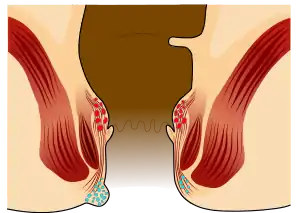Perianal hematoma
Perianal hematoma is a hematoma located in, or on the border of the anus.[1][2] It is sometimes inappropriately referred to as an external hemorrhoid.[2]
| Perianal hematoma | |
|---|---|
| Other names | External hemorroidal thrombosis, perianal thrombosis, anal vein thrombosis |
 | |
| Specialty | General surgery |
Signs and symptoms

The symptoms of a perianal hematoma can present over a short period of time. Pain, varying from mild to severe,[3] will occur as the skin surrounding the rupture expands due to pressure. This pain will usually last even after the blood has clotted, and may continue for two to four days.
Causes
Perianal hematoma are caused by the rupture of a small vein that drains blood from the anus.[4] This rupture may be the result of forceful or strained bowel movement, anal sex or caused by heavy lifting, coughing or straining. Once the rupture has formed, blood quickly pools within a few hours and, if left untreated, forms a clot.
Diagnosis
It is diagnosed with a visual and physical examination by a general practitioner or analologist.
Management
Management of thrombosed perianal hematoma has been poorly studied as of 2018.[5] If diagnosed within the first few hours of presentation, the pooling blood may be evacuated using a syringe. Once the blood has clotted, removal by this method is no longer possible and the clot can be removed via an incision over the lump under local anesthetic. The incision is not stitched but will heal. Care needs to be taken in regard to bleeding from the wound and possible infection with fecal bacteria. If left alone it will usually heal within a few days or weeks.[6] The topical application of a cream containing a heparinoid is often advised to clear the clot.[7]
References
- Australian Doctor Patient information sheet – Author: Professor John Murtagh
- Stein, Ernst (2003). Anorectal and colon diseases : textbook and color atlas of proctology (1st English ed.). Berlin: Springer-Verlag. p. 80. ISBN 9783540430391.
- Clinical Anatomy by Regions – Richard S. Snell (Google Books)
- "MerckSource". Archived from the original on 2008-02-02. Retrieved 2008-02-12.
- Davis BR, Lee-Kong SA, Migaly J, Feingold DL, Steele SR (March 2018). "The American Society of Colon and Rectal Surgeons Clinical Practice Guidelines for the Management of Hemorrhoids". Diseases of the Colon and Rectum. 61 (3): 284–292. doi:10.1097/DCR.0000000000001030. PMID 29420423.
- "Canadian Health, Disease, & Medication Information". MedBroadcast.com. Archived from the original on May 7, 2008.
- "Superficial Thrombophlebitis (Symptoms, Treatment, and Prognosis)". patient.info.